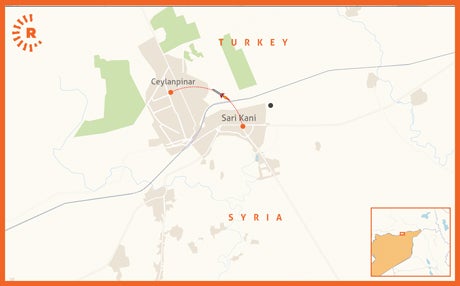
Syrian Democratic Forces members stand atop a roof next to a flag near Baghouz, Deir ez-Zor governorate, Syria, on March 24, 2019. File photo: Delil Souleiman | AFP
ERBIL, Kurdistan Region — US-backed Syrian Democratic Forces (SDF) arrested a suspect for launching a rocket into Turkey’s Sanliurfa province, wounding five or six people in a house amid continued tensions with Turkey, media close to the authorities in northern Syria announced on Monday.
Mustafa Bali, the head SDF Press Office, initially tweeted a shell was fired from “our region” and an investigation had been launched to uncover perpetrators. The SDF are the dominant force in northern Syria, primarily drawing members from the mostly-Kurdish People’s Protection Units (YPG).
Turkey’s Ministry of National Defense said a rocket was fired late Monday into Ceylanpinar district in the country’s southeastern Sanliurfa province, injuring five.
Hawar News, media close to the ruling authority of Rojava and the Self-Administration Authority of Northern and Northeastern Syria (NES), later announced an unnamed suspect was arrested for the missile attack.
Hawar added the attack was conducted by “unknown parties” from Sari Kaniye (Ras al-Ayn) in Syria’s Hasaka governorate. The suspect was arrested, according to Hawar, because the rocket fire was to stir “sedition and confusion.”
Graphic: Sarkawt Mohammed | Maps4News, Rudaw English
“This provocative act was done by unknown people who want to create sedition and damage stability in the region,” SDF spokesperson Kino Gabriel stated later on Monday.
The attack comes at a time when tensions are high between Turkey and the Kurdish authorities of northeastern Syria. Turkey considers the YPG to be the Syrian offshoot of the outlawed Kurdistan Workers’ Party (PKK). The YPG denies the allegation.
US officials are visiting Turkey on Monday and Tuesday to discuss the SDF among issues. The commander of US Central Command (CENTCOM) and the deputy US special representative for Syria Engagement and Special Envoy to the anti-ISIS coalition met with top SDF leaders and commanders in northwest Syria on Monday.
Turkish forces “in self-defense” gave the “necessary response” to the Syrian side of the border. Heavy weapons, seven targets were destroyed in the response, the Turkish defense ministry said in its tweet.
While the government claimed 5 people were injured, Turkey’s state-run Anadolu Agency reported that six people were wounded.
According to a statement from Sanliurfa’s governor office, the conditions of the injured were stable and some had been transferred to Ceylanpinar State Hospital, according to Turkey’s Daily Sabah news outlet. While Daily Sabah reported that YPG had carried out the attack, it also reported that investigations were ongoing.
Neither of the Turkish media, nor defense ministry stated the rockets were fired from the Kurdish enclave in northern Syria, known by some Kurds as Rojava.
Following the announcement of the defeat of ISIS east of the Euphrates in Syria by the SDF in March, US President Donald Trump announced he would withdraw US troops from Syria, as ISIS had been defeated.
Following the announcement, fears of an imminent Turkish invasion came forth. Top advisors, diplomatic, and military advisors cautioned of a pre-mature withdraw allowing the group to reform or evolve. Turkey including President Recep Tayyip Erdogan has threatened an invasion of SDF-held territories to “cleanse the area of terrorists.”
Trump scaled back his withdrawal plans and an unspecified number of forces of the US-led international anti-ISIS coalition remain in northern Syria, mainly to continue to help locals stabilize areas once controlled by ISIS through continued aid to the SDF and the establishment of civil and military councils. The areas have had little to no presence by the Syrian regime.
The United States has proposed for European partners, such as France and Germany, as well as regional forces send troops into Syria to share the burden.
Amid talks of US-European troop presence to protect US allies, a safe zone also has been repeatedly proposed in various multiple versions by the Americans and Turks who have been unable to reach an agreement.
Turkey wants a safe zone that goes as deep as 40 kilometers into Syria, emptied of an SDF and YPG presence. Kurds have refused that.
SDF commander Mazlum Abdi said of his discussions with the US officials in an interview with Yeni Özgur Politika newspaper that the SDF would accept a 5 kilometer buffer zone where local forces in Kobane and other areas would remain, but heavy weapons moved.
Besides local forces, the SDF wants a neutral international force patrolling the area. Earlier this year the United State and Turkey said they were training together for the Syrian joint patrols in turkey. Abdi conditioned that the SDF could only accept Turkey’s soldiers being part of the patrols only if Turkey is willing to withdraw from Afrin.
“If this happens, as a gesture of good will Turkish soldiers could be part of the patrols," he said.









Comments
Rudaw moderates all comments submitted on our website. We welcome comments which are relevant to the article and encourage further discussion about the issues that matter to you. We also welcome constructive criticism about Rudaw.
To be approved for publication, however, your comments must meet our community guidelines.
We will not tolerate the following: profanity, threats, personal attacks, vulgarity, abuse (such as sexism, racism, homophobia or xenophobia), or commercial or personal promotion.
Comments that do not meet our guidelines will be rejected. Comments are not edited – they are either approved or rejected.
Post a comment